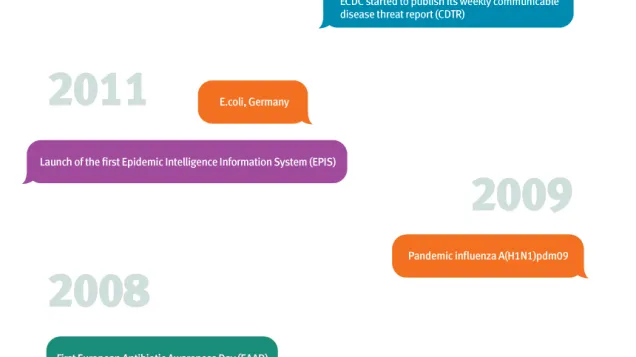ECDC 10 years - 10 highlights of ECDC's work

ECDC was created in 2005 but the idea of creating a European public health agency emerged already in 2003 when the SARS outbreak posed a serious threat to Europe. It became clear that there was an urgent need for a better coordination of the Member States’ response to the outbreak and scientific advice on options to control such an outbreak at the EU level.
ECDC’s main role as an agency of the European Union is to strengthen Europe’s defences against communicable diseases. Over the last ten years, ECDC has been working together with all EU/EEA countries in response to public health threats and emerging diseases.
One of the biggest achievements has been to make available Europe-wide data to all stakeholders, with the launch of the European Surveillance System (TESSy). ECDC centralised the previous Dedicated Surveillance Networks and replaced the 17 data collection systems into one system for the collection, validation, cleaning, analysis and dissemination of data from all EU/EEA countries.
10 highlights of ECDC's work
Here is a selection of areas in which the Agency's contribution is making a difference.
1. Providing data
A key role of ECDC is to analyse and interpret data from EU Member States on 52 communicable diseases and conditions. ECDC gathers surveillance data related to infectious diseases, provides a Europe-wide analysis, allowing for more visible trends and patterns across the Member States. With the launch of the European Surveillance System (TESSy), ECDC has centralised the previous Dedicated Surveillance Networks and replaced the 17 data collection systems into one system for the collection, validation, cleaning, analysis and dissemination of data from all EU/EEA countries.
The Annual Epidemiological Report gives an overview of the epidemiology of all the key communicable diseases of public health significance in Europe. As of the 2014 edition, it is published one disease group at a time to facilitate more timely publication. Besides, in September 2014, ECDC launched the Surveillance Atlas of Infectious Diseases, a web-based tool allowing the user to interact with the latest surveillance data for specific diseases.
- Surveillance at ECDC
- European Surveillance System (TESSy)
- Surveillance Atlas of Infectious Diseases
2. Advising Member States and EU institutions
ECDC provides advice upon request from Member States and EU institutions, which regularly send scientific enquiries. ECDC also performs country visits to analyse the current epidemiological situation of a certain disease, review current prevention and control efforts and propose actions for strengthening the response to that disease.
3. Training in intervention epidemiology and public health microbiology
ECDC coordinates the European Programme for Intervention Epidemiology Training (EPIET). Thanks to this training programme for field epidemiologists, EPIET trainees and alumni have contributed to the investigation and control of many outbreaks.
ECDC also manages the European Public Health Microbiology training programme (EUPHEM), providing training and practical experience in public health microbiology at associated training sites.
- EPIET
- EUPHEM
4. Supporting Member States in their preparedness for outbreak situations
ECDC assesses the risk for Europe posed by emerging threats from Europe but also from the rest of the world. By carefully monitoring any unusual signals, ECDC helps to detect threats at an early stage.
Preparedness is the key to handling crises in the best possible way. ECDC assists Member States in evaluating their level of preparedness, identifying potential gaps and vulnerabilities, and strengthening their capacities where needed.
5. Field missions for outbreak support
ECDC supports Member States facing communicable disease outbreaks by sending experts to the field. For example, during the West Nile virus outbreak in Greece in August 2010, ECDC sent a team of virologists, epidemiologists and entomologists to help the Greek authorities.
ECDC also contributes to missions outside the European borders. For example, during the ongoing Ebola outbreak in West Africa, ECDC staff have been deployed under the WHO operations (GOARN).
6. Connecting networks and creating a community for public health
ECDC has a key role in pooling knowledge, exchanging information and best practices among experts in Europe. In particular, ECDC coordinates the various disease networks, organises specific expert meetings and convenes working groups, in order to capitalise on the existing knowledge in the Member States.
7. International scientific conference
ESCAIDE, the European Scientific Conference on Applied Infectious Disease Epidemiology, is a three-day annual scientific conference, open to the wider communicable disease surveillance community. It mainly gathers epidemiologists and microbiologists, to share their scientific knowledge and experience in the field of communicable disease surveillance, prevention and control. In 2014, ESCAIDE had over 600 participants, the highest number so far.
ESCAIDE 2015 from ECDC on Vimeo.
8. European awareness initiative
The European Antibiotic Awareness Day (EAAD) is an initiative organised each year on 18 November, to raise awareness on the prudent use of antibiotics. ECDC provides various materials such as key messages and adaptable templates for the countries to use according to their needs and specificities. Over the years, the initiative has been increasingly successful, involving more countries and partners around the globe.
- EAAD
- EAAD on Youtube
9. Scientific journals
ECDC staff are authors to numerous publications in peer-reviewed scientific journals. Between 2005 and 2015, ECDC staff have published over 500 publications in journals on behalf of the Centre.
ECDC is also the publisher of Eurosurveillance, one of the main journals in the field of communicable diseases. ECDC grants editorial freedom to the Eurosurveillance team so the journal is independent from ECDC’s views and policy.
10. Partnerships at European and international level
ECDC works in close collaboration with WHO/Europe and the European Commission on key strategic health issues. On more technical issues, ECDC works with other EU Agencies: the European Food Safety Authority (EFSA), the European Medicines Agency (EMA), the European Environment Agency (EEA) and the European Monitoring Centre for Drugs and Drug Addiction (EMCDDA).
Related content
Share this page

